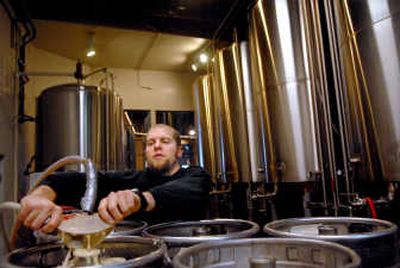Trouble brewing: Price of hops hits home

Don’t be surprised if a pint of beer costs a bit more at the local brewpub.
Brewers are declaring a state of emergency because of a scarcity of hops, one of the three key ingredients in beer.
The situation came to a head last fall, when growers announced a shortage brought about by a number of variables, including poor crop yields in Europe and Australia, a dwindling number of hop farmers worldwide and a 2006 distributor warehouse fire in Yakima, where a large percentage of the world’s hops are grown.
“It’s bad. I mean, it’s really bad,” said Mark Irvin, owner and head brewer at Northern Lights Brewing Co. in Spokane. “The breweries will not get the hops that they need, and some will go out of business. It’s so bad that there’s just not enough hops to go around for everybody who wants them.”
Larger breweries purchase hops under contract with a distributor, meaning they’re guaranteed a certain amount of each variety. But many small companies in the growing craft brewing industry, such as Northern Lights, buy hops on the open market.
Irvin, a member of the fledgling Washington Beer Commission organized to promote the growth of the state’s beer industry, sent a letter to his clients in October explaining a price increase from $115 to $140 a keg for his hoppier brews.In the letter, Irvin explained that the cost for the hops used by the brewery went up 100 percent in the some cases, and by 400 percent in others – particularly for the Cascade, Columbus and Centennial hops used in the brewery’s flagship India Pale Ale.
Some varietals aren’t available in any worthwhile quantity to anyone but large contracted breweries.
Bob Ketcham, owner of Jim’s Homebrew on North Division Street in Spokane, said he can’t get some varieties into the shop at all. In some cases, he refuses to sell hops to customers who aren’t buying a number of other ingredients as well – the hops are that precious.
“We just have to be creative, and I’ll juggle things around for different types of beers,” Ketcham said. “If it has a hop signature that everyone expects, like Columbus, Cascade and Centennial, are they going to change it up or stop producing that beer?”
For the time being, Northern Lights’ Irvin is going with door No. 1.
“I’ve had to start blending varieties of hops together,” he said. “I haven’t been able to get all the specific varieties of hops I need.”
Irvin said he recently lucked into five cases of Cascade hops imported from Argentina by Yakima distributor Hop Union. He paid six times the regular price, and he hopes that’ll help get him through the year.
New brewpub owners without Irvin’s 14 years of experience have yet to build the connections or clout to ride this one out.
Steve Hedrick opened Northern Ales in Northport, Wash., in June 2007. After only half a year in the business, he’s scrambling to snag hops so he can stay afloat.
“We can’t get any at all at the moment. We’re working off what we ordered several months ago,” Hedrick said. “We’re trying to line up some open-market hops for this month. I’m seriously looking into starting some spiced beers, or gruit, it’s called. Making spruce beers and coriander beers, looking at doing a traditional Scotch ale, which would be made with heather, which is another herb. It’s gonna be interesting.”
Brewers from around the country and beyond have been hounding Fred Colby, of Ponderay, Idaho, whose Laughing Dog Brewing secured a hops contract for 2008, to sell them some surplus.
“We factored in enough for growth, and we always fudge a little bit over just to make sure we have enough,” Colby said. “We’ve been trying to share a little bit. … I sold some of them out well below the market price to some of the breweries that were in need of them.”
Colby added, “Now, looking forward at the end of 2008, I probably would sit on what I have left in my contract.”
Unlike Colby, Northern Ales’ Hedrick, without a contract and without a supply of hops in his back pocket, continues to brainstorm solutions.
“We have about 2 1/2 acres of fenced field where we’re going to be planting more than likely several hundred hop rhizomes this spring,” Hedrick said, “which should be enough to supply us in a couple of years. Hops don’t really get their full production until the third year. But that’s part of our contingency plan, to start growing our own.”